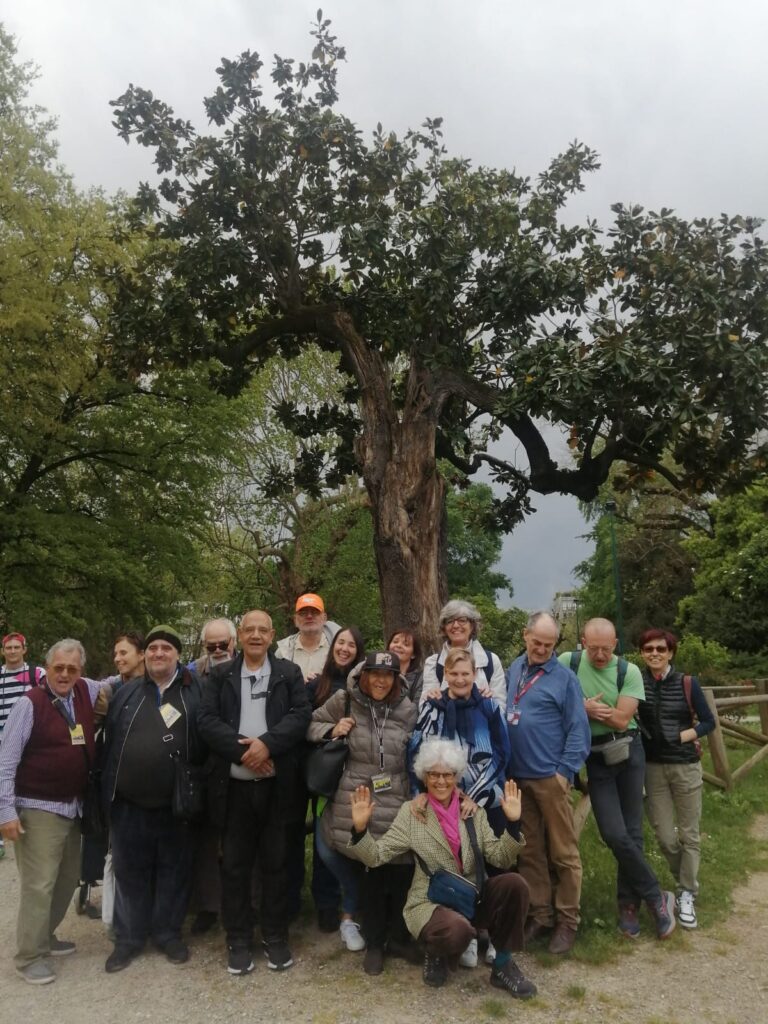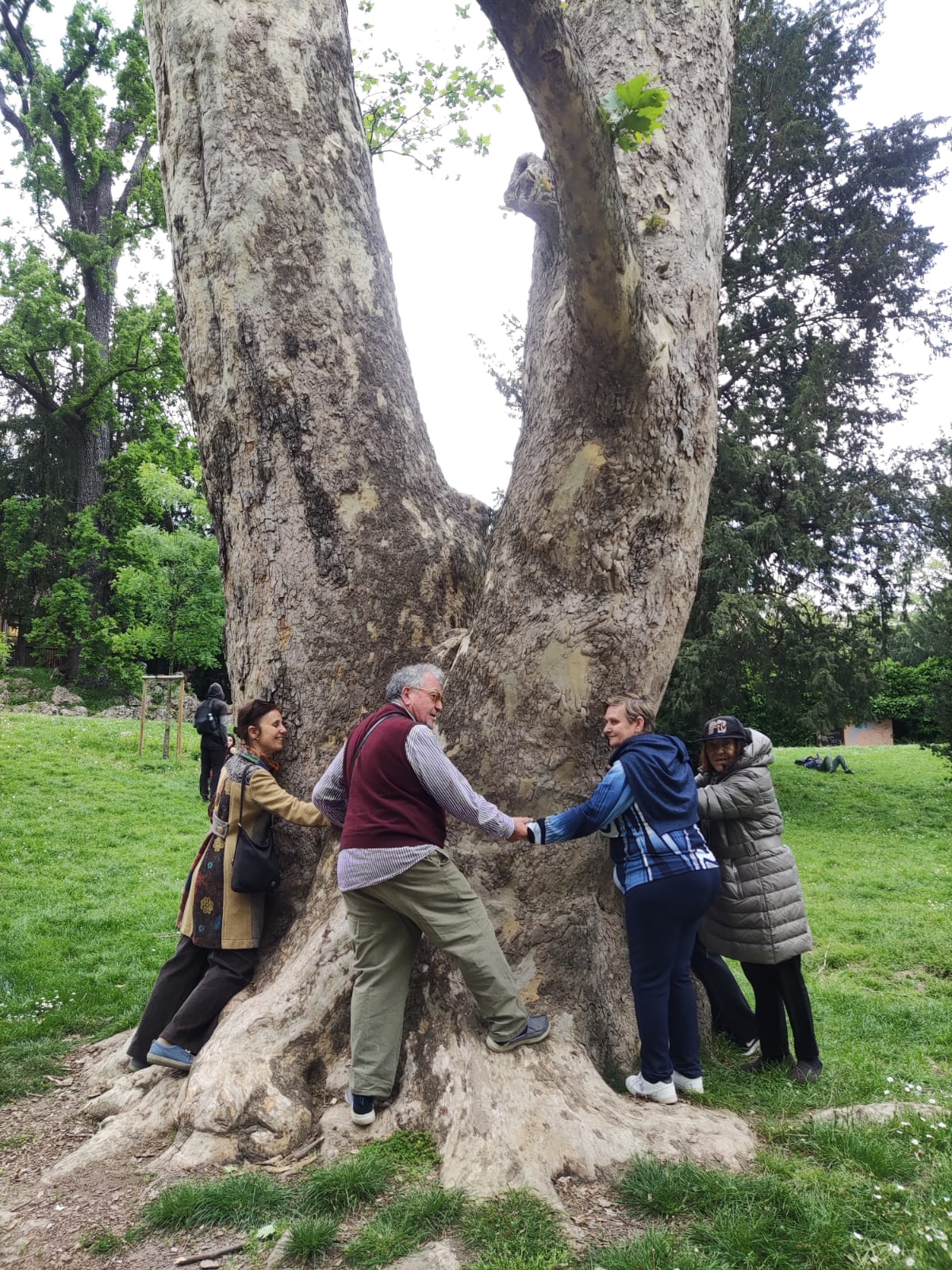Workshops and small-scale actions for identifying and assessing solutions for greener cities and enhancing the citizens’ role in advocating and promoting sustainable changes
As part of our Green rights project, we have planned, the small-scale actions were implemented based on the results of the discussions held within the framework of WP3.
Small-scale actions were a testbed for actions and tools that could be repeated also in other countries to involve those who were generally underrepresented in the activities to claim for a better climate.
Furthermore, the analysis highlighted in D3.1 – Country Report, Italy, emphasized the severe risks of ongoing climate change for the most vulnerable populations in the cities of Milan and Turin.
First small scale action: “Walking for our environment”, Milan on April 17, 2024
 The first small scale action originated from the discussions (workshop n. 8) with the educators and guests of the day center for the unhoused in Milan, Opera Cardinal Ferrari.
The first small scale action originated from the discussions (workshop n. 8) with the educators and guests of the day center for the unhoused in Milan, Opera Cardinal Ferrari.
Amapola organized a local action on April 17, 2024, which involved elderly homeless individuals and volunteers from Opera Cardinal Ferrari Onlus. In collaboration with the “Gatti Spiazzati” association, which involves homeless people as city guides, a participatory walk was organized through the Montanelli Gardens in Milan. The choice of location was deliberate, as the park is frequently visited by homeless individuals during the day, who use it as a place to rest on benches. During the walk, participants observed the effects of climate change on the large trees in the garden, such as strong winds and alternating droughts and violent rains. They also noticed the lack of water absorption by the soil, the presence of non-native animals, and the increased eutrophication in the pond. Additionally, they experienced rapid temperature changes in the same afternoon.
To address these issues, participants were encouraged to keep the area clean, collect branches for a workshop, feel and take care of the environment, and observe, recognize changes, and report them.
The action concluded with a snack and sharing session, where participants expressed their appreciation for the fragile environment, the rapid disappearance of life, and the impact of weather changes on flowering. They also emphasized the importance of preserving urban green spaces that belong to everyone.
Overall, the event was successful in raising awareness about the environment, promoting active involvement, and fostering a sense of community among participants, particularly among the elderly homeless guests of Opera Cardinal Ferrari Onlus and the volunteers involved.
A total of 16 people participated in the small-scale activity, including homeless citizens and their educators, who will be able to periodically organize similar activities in the future.
In this experience, the need to involve the extremely vulnerable population to climate change has emerged, with the dual purpose of listening to their direct testimony of the impact of climate change and raising awareness about the new risks, dangers, and possible solutions to some of the effects. For example, as an illustrative example, possible shelters from heavy rains and floods and from summer heatwaves.
Second small scale action: Food and sustainability: a talk with migrant women, Turin on May 28, 2024
 The second small-scale action was conducted with the Almaterra APS association, which has historically focused on welcoming migrant women in northern Turin. During the discussions (workshop no. 2), it emerged that the migration experience (from particularly fragile countries) involves distrust towards the use of domestic running water or from public dispensing points, as well as a lack of information regarding the seasonality of fruits and vegetables. The consumption of local and seasonal fruits, vegetables, and legumes is indeed a concrete action for the preservation of the environment and the ecosystem. Additionally, it has a beneficial effect on health, nutritional intake, and, if well analyzed, can help save on food expenses. Therefore, it is also feasible for low-income migrant families.
The second small-scale action was conducted with the Almaterra APS association, which has historically focused on welcoming migrant women in northern Turin. During the discussions (workshop no. 2), it emerged that the migration experience (from particularly fragile countries) involves distrust towards the use of domestic running water or from public dispensing points, as well as a lack of information regarding the seasonality of fruits and vegetables. The consumption of local and seasonal fruits, vegetables, and legumes is indeed a concrete action for the preservation of the environment and the ecosystem. Additionally, it has a beneficial effect on health, nutritional intake, and, if well analyzed, can help save on food expenses. Therefore, it is also feasible for low-income migrant families.
Consequently, on May 28, 2024, a guided tour of the public water dispensing points in the Aurora district of Turin was organized, along with an awareness-raising activity in classrooms and at the market regarding the seasonality of vegetables and legumes.
The action included a physical visit to the city’s potable water dispensing points, where participants were able to directly experience the free distribution of water.
Eighteen Italian women of migrant origin and two adult educators from the Almaterra association participated in the action. The activity was very well received by all the participants, who asked many questions about the history of drinking water in Italy and Europe and the actual opportunity to freely drink from domestic taps. Food and seasonality were also sources of questions, particularly related to price and the actual environmental impact of consuming seasonal food.
The project has developed a vegetable and legume card suitable for the Italian courses at levels A1 and A2 offered by Almaterra APS to the participating women, with the aim of automatically multiplying the recipients of the action.
Regarding the drinkability of domestic water, the desired effect is not only better health for migrant women but also reduced use of plastic water bottles
We estimate that the small-scale action is replicable in contexts of food security and in areas where domestic water is subject to strict controls.
Cofinanziato dall’Unione europea. I punti di vista e le opinioni espresse sono tuttavia esclusivamente quelli degli autori e non riflettono necessariamente quelli dell’Unione europea o dell’Agenzia esecutiva europea per l’istruzione e la cultura (EACEA). Né l’Unione Europea né l’autorità che concede il finanziamento possono essere ritenute responsabili.


